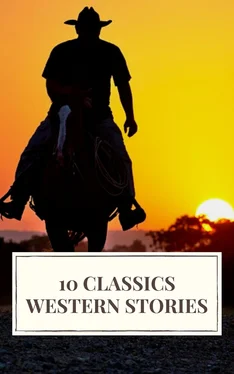Solemnity and awe came to him. He had seen the bridge of his vision; he had in truth been divinely called to his work. He felt that the sight of the bridge was both the visible seal of God upon his mission and a sign that its accomplishment was close at hand. He bowed his head involuntarily, as in the presence of the Most High. He felt that he rode to his destiny, that for him all things converged and culminated at the great council.
They had not advanced far into the wood ere the whole train came to a sudden halt. Riding forward, Cecil found a band of horsemen awaiting them. They were Klickitats, mounted on good ponies; neither women nor pack-horses were with them; they were armed and painted, and their stern and menacing aspect was more like that of men who were on the war-trail than of men who were riding to a “peace-talk.”
The Cayuses halted a short distance away. Snoqualmie rode forward and met the Klickitat chief in the space between the two bands. A few words passed, fierce and questioning on the part of the Klickitat, guarded and reserved on the part of the Cayuse. Then the Klickitat seemed to suggest something at which the Cayuse shook his head indignantly. The other instantly wheeled his horse, rode back to his band, and apparently reported what Snoqualmie had said; for they all set up a taunting shout, and after flinging derisive words and gestures at the Cayuses, turned around and dashed at full gallop down the trail, leaving the Cayuses covered with a cloud of dust.
And then Cecil knew that the spectacle meant war.
The air grew softer and more moist as they descended the western slope of the Cascade Range. The pines gave way to forests of fir, the underwood became denser, and ferns grew thick along the trail. It had rained the night before, and the boughs and bushes hung heavy with pendant drops. Now and then an Indian rider, brushing against some vine or maple or low swaying bough, brought down upon himself a drenching shower. The disgusted “ugh!” of the victim and the laughter of the others would bring a smile to even Cecil’s lips.
And so approaching the sea, they entered the great, wooded, rainy valley of the lower Columbia. It was like a different world from the desert sands and prairies of the upper Columbia. It seemed as if they were entering a land of perpetual spring. They passed through groves of spreading oaks; they skirted lowlands purple with blooming camas ; they crossed prairies where the grass waved rank and high, and sunny banks where the strawberries were ripening in scarlet masses. And ever and anon they caught sight of a far snow peak lifted above the endless reach of forest, and through openings in the trees caught glimpses of the Columbia spreading wide and beautiful between densely wooded shores whose bending foliage was literally washed by the waters.
At length, as the sun was setting, they emerged from the wood upon a wide and level beach. Before them swept the Columbia, broader and grander than at any previous view, steadily widening as it neared the sea. Opposite them, another river, not as large as the Columbia, but still a great river, flowed into it.
“Willamette,” said the young runner, pointing to this new river. “Wappatto Island,” he added, indicating a magnificent prospect of wood and meadow that lay just below the mouth of the Willamette down along the Columbia. Cecil could not see the channel that separated it from the mainland on the other side, and to him it seemed, not an island, but a part of the opposite shore.
Around them on the beach were groups of Indians, representatives of various petty tribes who had not yet passed to the island of council. Horses were tethered to the driftwood strewed along the beach; packs and saddles were heaped on the banks awaiting the canoes that were to carry them over. Across the river, Cecil could see upon the island scattered bands of ponies feeding and many Indians passing to and fro. Innumerable lodges showed among the trees. The river was dotted with canoes. Never before had he beheld so large an encampment, not even among the Six Nations or the Sioux. It seemed as if all the tribes of Puget Sound and the Columbia were there.
As they halted on the bank, a little canoe came skimming over the water like a bird. It bore a messenger from Multnomah, who had seen the Cayuses as soon as they emerged on the beach.
“Send your packs over in canoes, swim your horses, camp on the island,” was the laconic message. Evidently, in view of the coming struggle, Multnomah wanted the loyal Cayuses close at hand.
In a little while the horses were stripped of their packs, which were heaped in the canoes that had followed the messenger, and the crossing began. A hair rope was put around the neck of a horse, and the end given to a man in a canoe. The canoe was then paddled out into the stream, and the horse partly pulled, partly pushed into the river. The others after much beating followed their leader; and in a little while a long line of half submerged horses and riders was struggling across the river, while the loaded canoes brought up the rear. The rapid current swept them downward, and they landed on the opposite bank at a point far below that from which they started.
On the bank of the Columbia, near Morgan’s Lake, an old gnarled cottonwood still marks the ancient landing-place; and traces remain of the historic trail which led up from the river-bank into the interior of the island,—a trail traversed perhaps for centuries,—the great Indian road from the upper Columbia to the Willamette valley.
The bank was black with people crowding out to see the latest arrivals. It was a thronging multitude of dusky faces and diverse costumes. The Nootka with his tattooed face was there, clad in his woollen blanket, his gigantic form pushing aside the short Chinook of the lower Columbia, with his crooked legs, his half-naked body glistening with grease, his slit nose and ears loaded with hiagua shells. Choppunish women, clad in garments of buckskin carefully whitened with clay, looked with scorn on the women of the Cowlitz and Clatsop tribes, whose only dress was a fringe of cedar bark hanging from the waist. The abject Siawash of Puget Sound, attired in a scanty patch-work of rabbit and woodrat skin, stood beside the lordly Yakima, who wore deerskin robe and leggins. And among them all, conscious of his supremacy, moved the keen and imperious Willamette.
They all gazed wonderingly at Cecil, “the white man,” the “long beard,” the “man that came from the Great Spirit,” the “ shaman of strong magic,”—for rumors of Cecil and his mission had spread from tribe to tribe.
Though accustomed to savage sights, this seemed to Cecil the most savage of all. Flat heads and round heads; faces scarred, tattooed, and painted; faces as wild as beasts’; faces proud and haughty, degraded and debased; hair cut close to the head, tangled, matted, clogged with filth, carefully smoothed and braided,—every phase of barbarism in its most bloodthirsty ferocity, its most abject squalor, met his glance as he looked around him. It seemed like some wild phantasmagoria, some weird and wondrous dream; and the discord of tongues, the confusion of dialects, completed the bewildering scene.
Through the surging crowd they found their way to the place where their lodges were to be pitched.
On the morrow the great council was to begin,—the council that to the passions of that mob of savages might be as the torch to dry brushwood. On the morrow Multnomah would try and would condemn to death a rebel chief in the presence of the very ones who were in secret league with him; and the setting sun would see the Willamette power supreme and undisputed, or the confederacy would be broken forever in the death-grapple of the tribes.
Chapter 4 AN INDIAN TRIAL.
Читать дальше












